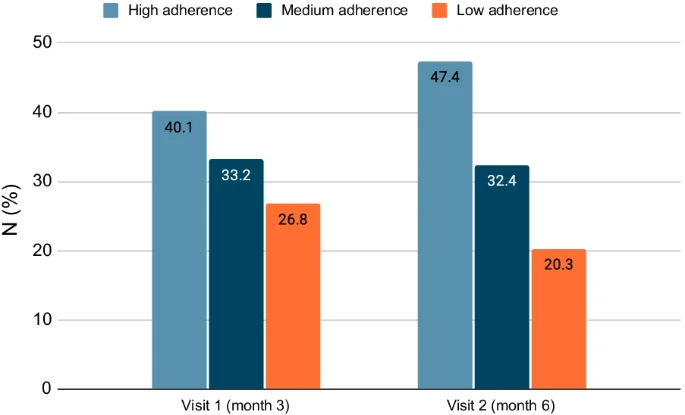Research – Open Access
Konstantinos P. Exarchos, Nikoletta Rovina, George Krommidas, Dimitrios Latsios, Athena Gogali & Konstantinos Kostikas
BMC Pulmonary Medicine volume 22, Article number: 254 (2022)
Abstract

Background
Asthma is a chronic inflammatory disease of the airways that causes recurring episodes of wheezing, breathlessness, chest tightness and coughing. Inhaled drugs on a daily basis are the cornerstone of asthma treatment, therefore, patient adherence is very important.
Methods
We performed a multicenter, open, non-interventional, observational, prospective study of 716 adult patients diagnosed with asthma receiving FDC (Fixed-dose combination) budesonide/formoterol via the Elpenhaler device. We assessed the adherence to treatment at 3 and 6 months (based on the MMAS-8: 8-item Morisky Medication Adherence Scale), the quality of life and change in forced expiratory volume in 1 s (FEV1) from baseline to follow-up.
Results

Approximately 80% of the patients showed medium to high adherence throughout the study. The mean (SD) MMAS-8 score at 6 months was 6.85 (1.54) and we observed a statistically significant shift of patients from the low adherence group to the high adherence group at 6 months. Moreover, after 6 months of treatment with FDC budesonide/formoterol, we observed an increase in the patients’ quality of life that as expressed by a change 2.01 (95%CI 1.93–2.10) units in Mini AQLQ (p < 0.0001) that was more pronounced in the high adherence group. The same trend was also observed in terms of spirometry (mean FEV1 2.58 L (0.85) at the end of the study, increased by 220 mL from baseline) with a higher improvement in the medium and high adherence groups.
Conclusions
Treatment with FDC of budesonide/formoterol via the Elpenhaler device was associated with improvement in asthma-related quality of life and lung function over 6 months that were more prominent in patients with higher adherence.
